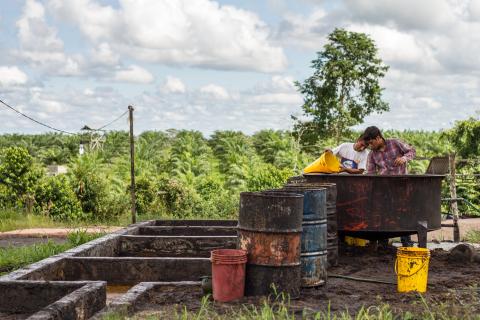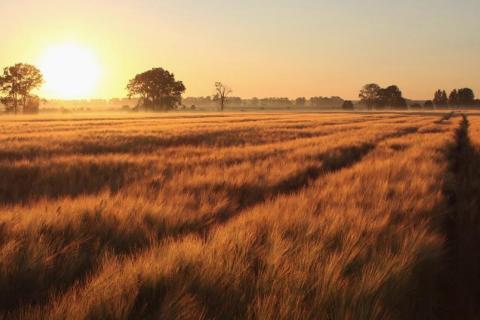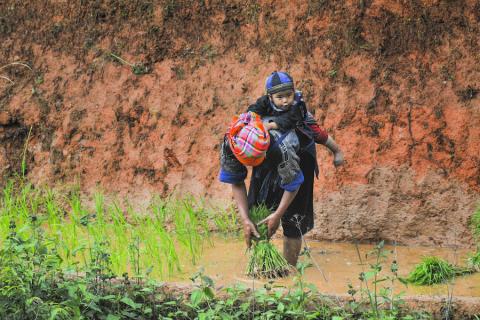This Is Our Land: Why Reject the Privatisation of Customary Land
WHY REJECT CUSTOMARY LAND PRIVATISATION
Most of the world’s land is still stewarded by communities under customary systems. Billions of people rely on communally managed farmland, pasture, forests and savannahs for their livelihoods.
This collective management of resources is viewed in the colonial or capitalist economic model as an obstacle to individual wealth creation and private profit.
Sharing land governance knowledge within the Dutch government through LAND-at-scale
The main objective of the LAND-at-scale program is to directly strengthen essential land governance components for men, women and youth that have the potential to contribute to structural, just, sustainable and inclusive change at scale. An ambitious objective, that cannot be achieved in isolation. Alignment is, therefore, a key factor in all LAND-at-scale activities - be it at project level for our country interventions or through our collaborative approach to knowledge management.
Investing in Formal Land Rights for Commodity Smallholder Farmers: Lessons from land tenure public-private partnerships
The Côte d’Ivoire Land Partnership (CLAP) brings public and private sectors together to work for affordable land documentation for smallholder farmers at scale. The panellists explained that land security should be at the core of corporate sustainability agendas because it translates into benefits across supply chains. Providing smallholder farmers with land documentation to strengthen their land rights has an impact on their lives, their families and also their productivity.
Development Impact of Land-Based Investment in Times of Crisis: Learning and exchange by the LANDac Professional Learning Network
The session addressed the impacts of land-based investments on poor and vulnerable people in the Global South. It facilitated an exchange of knowledge about the strategies that are employed on the ground to strengthen the position of these groups when it comes to negotiating for their interests with investors amidst the climate crisis and the global pandemic. How might we, as practitioners, researchers and policymakers contribute to increased developmental impact of land-based investments, especially in times of crisis?
Critical Insights on the Land Governance Orthodoxy
This panel took a critical look at the land governance orthodoxy that has consolidated on the heels of the financial crisis and outcry over "global land grabs" at the end of the 2000s.
Setting the Stage: LANDac Conference 2021 Opening Session and Keynote Speeches
The LANDac Conference 2021 was opened by the Co-Chairs of LANDac, Dr. Gemma van der Haar from Wageningen University and Dr. Guus van Westen from Utrecht University. Dr. Guus van Westen noted that theirs is the 11th consecutive LANDac conference, and that last year, labeling the conference an Online Encounter, we were not yet ready to accept the new reality of COVID-19. This shift has enabled LANDac to reach new audiences that were not previously part of the LANDac crowd.
Behind the Brands 8 Years Later: An assessment of food and beverage companies’ delivery of land rights commitments
From 2013 to 2016, Oxfam's Behind the Brands campaign called on the 10 biggest food and beverage companies to adopt stronger land rights commitments. Now, as the coronavirus pandemic worsens inequality and food insecurity around the world, we asked the question: Are companies taking meaningful steps to implement their commitments?
Looking at the future of customary rights in the forest landscapes of the Mekong region
In some closing words to the Forum, Vicky Tauli-Corpuz (UN Special Rapporteur on the Rights of Indigenous Peoples, United Nations) applauded the attention given to customary land tenure. For communities there has always been a struggle for their practices to be acknowledged, despite the fact that these existed long before the arrival of state governments. She found much promise in some of the legal work taking place in the Mekong region.
Setting the scene: What are the RAI principles and how do they apply to Mekong forest landscapes?
The second day of the Forum built upon discussions around customary land tenure in the Mekong region, but with a focus upon private sector investment practices, particularly concerning agriculture and the potential impact on smallholder farmers, the rural poor, and the environment.
Demystifying FPIC: Tools to support development, avoid conflict and respect community rights
The third session of the Forum explored the nature of FPIC (Free, Prior and Informed Consent) and how it fits into the Mekong landscape, using case studies from a Vietnamese coffee project, and a company seeking land for eucalyptus plantations in Lao PDR.
Presentation 1
Responsible Agricultural Investment in Mekong forest landscapes
The fourth session of the Mekong Land Forum introduced the ASEAN Guidelines on Promoting Responsible Agricultural Investment and identified some of the challenges ahead in implementation. Two companies shared their experiences working with a strong policy in CSR (Corporate Social Responsibility), so that we could consider how company practices can align with the Guidelines.












